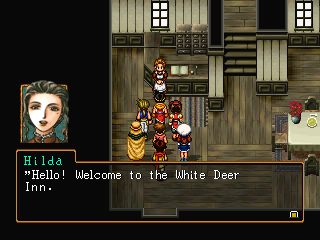Don’t be an NPC

When I was younger, I loved to play role-playing games (RPGs). In such games, we have a term for characters in the game whom the player doesn’t control, who perform well-defined, mostly automated roles: non-player characters (NPCs).
As players, we control the heroes in the story, but for the story to be engaging, our heroes need to interact with others. Hence the existence of NPCs.
The villains of the game are NPCs. The damsel in distress who drives the story forward is an NPC. The shopkeepers and innkeepers who buy our loot and provide us a place to rest (and regain hit points), the characters who randomly loiter about town and give us hints on where to go next, and even the bad guys in the dungeons who wait for us to encounter and defeat them - all are NPCs.
It’s this final category of NPCs that I want to talk about. I’ve always felt an uneasy pity for them because they don’t actually do anything. They stay in one place or wander about aimlessly, the only purpose of their existence to one day move the story forward for a character other than themselves.
NPCs' existences are mostly automatic routines, so I think my uneasiness stems from a personal fear of living a similarly routine life. This is especially true these days, since the arrival of my baby daughter has made some daily routines unavoidable. If my life were entirely made up of routine activities, then I wouldn’t really be living at all. As a wise person once said, “Life isn’t about the number of breaths you take - it’s about the number of moments that take your breath away.”
Perhaps I’m unconventional in this regard. After all, Chinese tradition values a routine and peaceful life. “寧為太平犬,不做亂世人” is a Chinese saying that states, “Better to live as a dog in times of peace, than as a person in times of chaos.” The term “平凡” (which translates to “ordinary” in English) has positive connotations and is a state to be admired. Even my parents think so - for my sister’s Chinese given name, they chose the character “凡”.
However, just as my sister has disliked this name since childhood, I also view an ordinary life as something to be avoided where possible. To give structure to this problem, I like to reference the RPG analogy and consider: “What are some things that NPCs don’t normally do?” And then I’ll do those things. (I’ll share some ideas below.)
Travel and relocate a lot
NPCs tend to stay in one place. Like frogs in a well, their vision of the world is narrow, and they have no opportunities to experience life beyond their current surrounding environment.
We, on the other hand, have a choice in the matter. The world is a big place with so much to explore and interact with. Travelling repeatedly to new destinations is self-directed proof that we’re not limited to automated motions in a pre-defined reality.
Cultivate new relationships
NPCs don’t make new friends, but we can. In another blog post, I referenced research that discovered relationships are the most important factor for determining one’s happiness. By meeting new people and tending to those relationships, we can generate more possibilities - a life partner, a new home, a new job or line of work, more knowledge, more experiences, and so on.
Part of the reason I am passionate about my profession is because through it, I meet dozens of new people each year. Many of them tell me their life stories, their personal challenges, and their aspirations. Some become lifelong friends.
In role-playing games, only the heroes of the story get to change the world in some way. Meanwhile, in real life, though most of us have no desire (or lack the ability and determination) to start the next corporate giant or lead a major country, this doesn’t mean that we can’t have a lasting impact.
Any meaningful work we do can inspire the people it touches. We can choose to spend our lives creating or sharing things that create value, and in doing so change the world in a non-trivial way.
Use routine time to plan non-routine things
As human beings, we have a remarkable ability to think beyond the present moment. Our basic instincts are still naturally biased towards instantaneous gratification, but we are intellectually equipped to take a longer-term view and plan for the future.
For most of us, some amount of daily routine is unavoidable. We commute to work, have three meals a day, and tell bedtime stories to our kids. We might need to pick up the groceries and cook, or walk the dog, or help with homework. Some other routines are consciously chosen by us: exercising, reading, watching TV, interacting on social media, and so on.
I think it’s worth noting that we have significant control over not only what many of our routines are, but also how we complete our routines. In the age of mobile phones, we choose what apps we use or what podcasts we listen to during our morning commutes. We can often choose whom we have meals with and our conversation topics. We have the freedom to think about what we like while in the shower. Thus, routines don't really have to be routines.
NPCs don’t learn, but we do. NPCs don’t appear to think, but we do. Therefore, we may want to carefully consider what (and whether) we learn and what we think about. Ideally, these are non-routine things even when we go about our daily routines.




